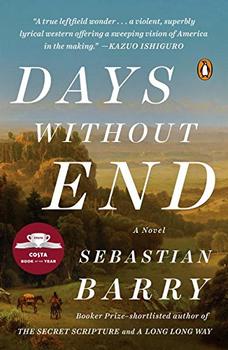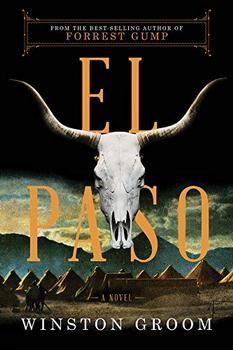Summary | Excerpt | Reviews | Beyond the book | Read-Alikes | Genres & Themes | Author Bio

The Son, Philipp Meyer's second novel, is a multi-generational tale of epic scope focusing on the settling of western Texas. Told in alternating voices, the author covers the area's history from the middle of the 19th century to the present day, touching on conflicts between white settlers and the native populations, the American Civil War, the ranching era and conflicts with Mexico, World Wars I and II, and the oil boom of the 20th century.
Three main characters relay this history through the telling of their life stories. Readers first meet the centenarian family patriarch, Eli McCullough, through the transcript of a WPA recording made in 1936. Eli, the son of ill-fated settlers, describes how he transformed himself from a teenage captive of the Comanche Indians into the wealthy founder of a large Texas cattle ranch over the course of his long life.
Next up is Eli's great-granddaughter, Jeanne Ann, who as the book opens is 86, alone in her Texas mansion, and is inexplicably lying on the floor unable to move or summon help. As she slips in and out of consciousness she contemplates scenes from her past, starting with her relationship with Eli when she was a child, through her years as a wife and mother and eventually to her success at transforming the family property from a money-losing ranch by investing in both local and international oil.
Bridging these two stories are the diary entries of Peter McCullough, Eli's son and Jeanne's grandfather, who bears witness to the less than upfront ways that the McCulloughs obtained their land. He is the exact opposite of the strong characters who bookend his narrative - a sensitive middle-aged man who feels intensely remorseful about his family's actions in the name of wealth.
The three stories don't overlap; instead each character's narrative runs chronologically – parallelling the others, but set in a different time period – and are distinctive in quality and style. Eli's first-person account is larger than life and almost mythic, rife in action, adventure and violence and the chapters featuring this character are the most involving and detailed parts of the book. His storyline is by far the most developed, and throughout these sections Meyer's writing is rich and descriptive, bringing the American West vividly to life. Jeanne's story, relayed in the third person, is the most convincing of the three; her frustration at being a woman in a man's world during the middle of the 20th century is particularly believable. Yet her tale peters out toward the end and begins to feel increasingly sketchy as it progresses. Peter's diary entries cover just two years, and while this character nicely balances the two strong, ruthless characters in the novel, readers don't get to know him well enough to have sympathy for him; he consequently comes off as a whiny milquetoast, and I spent much of my reading time wondering why this story was important in the context of the novel.
Regardless of the variations present in the plot itself, Meyers's writing is unrelentingly brilliant. His prose is straightforward but very compelling and evocative, pulling the reader completely into the story.
Spring 1849, the last full moon. We'd been two years on our Pedernales acreocracy, not far from Fredericksburg, when our neighbor had two horses stolen in broad daylight. Syphilis Poe, as my father called him, had come down from the Appalachian Mountains, imagining Texas a lazy man's paradise where the firewood split itself, the persimmons fell into your lap, and your pipe was always stuffed with jimsonweed. He was the commonest type on the frontier, though there were plenty like my father – intent on getting rich if they could stay alive long enough…The problem facing my father that morning was the theft of two scrawny horses and a conspicuous trail of unshod pony tracks leading into the hills. Common sense suggested the perpetrators might still be about – no self-respecting horse thief would have been satisfied with Poe's mangy swaybacked mares – but the law of the frontier demanded pursuit, and so my father and the other men rode off, leaving my brother and me with a rifle apiece and two silver-mounted pistols taken off a general at San Jacinto.
There is without doubt plenty of brutality sprinkled throughout the book but it's not gratuitous and certainly no more than one would expect from a typical Western - and in fact considerably less than is present in some of the other novels in the genre currently in circulation. There's also a fair amount of not-terribly-graphic sex (and those scenes involving Jeanne aren't especially convincing, at least from a woman's standpoint). Neither the amount of violence nor the number of sex scenes is overwhelming, but there's probably more here than would be appropriate for adults of a sensitive nature.
Meyer was selected in 2010 by The New Yorker as one of its "20 under 40" authors to watch, and so far he's lived up to the hype; The Son is every bit as entertaining as his debut novel, American Rust. This is historical fiction at its finest, and fans of literature written about the Old West will definitely find much to love here.
![]() This review was originally published in The BookBrowse Review in July 2013, and has been updated for the
February 2014 edition.
Click here to go to this issue.
This review was originally published in The BookBrowse Review in July 2013, and has been updated for the
February 2014 edition.
Click here to go to this issue.

If you liked The Son, try these:

by Sebastian Barry
Published 2017
Moving from the plains of Wyoming to Tennessee, Sebastian Barry's latest work is a masterpiece of atmosphere and language. An intensely poignant story of two men and the makeshift family they create with a young Sioux girl, Winona, Days Without End is a fresh and haunting portrait of the most fateful years in American history and is a novel never ...

by Winston Groom
Published 2017
Three decades after the first publication of Forrest Gump, and seventeen years since his last novel, Winston Groom returns to fiction with this sweeping American epic.
A library, to modify the famous metaphor of Socrates, should be the delivery room for the birth of ideas--a place ...
Click Here to find out who said this, as well as discovering other famous literary quotes!
Your guide toexceptional books
BookBrowse seeks out and recommends the best in contemporary fiction and nonfiction—books that not only engage and entertain but also deepen our understanding of ourselves and the world around us.